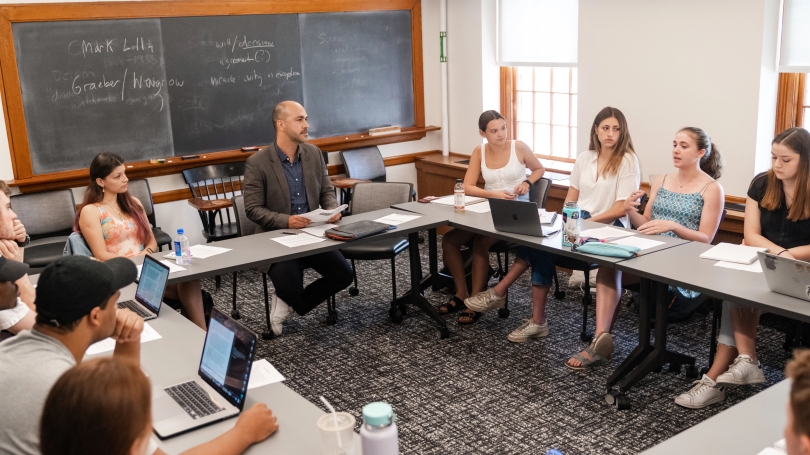
- About
- Consultation
- Programs
- Resources
- News & Events
Back to Top Nav
Back to Top Nav
Back to Top Nav
A panel of undergraduate students shares their perspectives at this year's New Faculty Orientation to Teaching
On August 1st, the Dartmouth Center for the Advancement of Learning (DCAL) hosted an orientation to teaching for new faculty. The day included an undergraduate student panel with Cady Rancourt, a '24 from Northern Minnesota who is designing a special major in Education Studies, Julie Gnany, a '25 from Mauritius studying Quantitative Social Science with a minor in Economics, Jessi Yu, a '25 from San Francisco studying Government and Sociology, and Lena Kufferman, a '25 from Connecticut studying Women's Gender, and Sexuality Studies and Geography.
First, the student panelists discussed things that had surprised them about their Dartmouth experiences. Lena shared about the prevalence of the Greek system, and elaborated on inequities in classrooms when first getting to Dartmouth. She explained that students arrive at the college from very different backgrounds, some from public schools, some from magnet schools, some homeschooled, and some from private and elite preparatory schools, which provide a wide range of preparation for students. These inequities are especially apparent in the fall when students first get to campus. In order to provide resources to all of your students, Lena suggested making sure that you offer and explain your office hours, because not all students know what office hours are or how to use them. This may be especially true among first-generation and low income (FGLI) students, and these are the students who may benefit from office hours the most. Lena also suggested the importance of emphasizing to your students that it's okay to not understand course material, and that no one at Dartmouth is perfect. If you are leading a writing-intensive class, for example, it might be a good idea to assign an ungraded early writing skills assessment at the beginning of the term. That way, you can provide feedback on new students' writing without consequences on their grades, and so that they have ample time to improve.
Another theme of discussion was the fast-paced nature of the quarter system. As Jessi explained, in a typical Dartmouth class, the first week is reserved for the syllabus, by week three students have midterms, and by week eight, students are starting final projects. This leaves only a few weeks of time dedicated to learning new content. To alleviate stress, be clear and firm about final project dates in the very beginning of the term, and consider "frontloading" your longest and most intensive readings, so that students get a solid foundation of class material before midterms. Additionally, although many students do not utilize the full two-week course "shopping period" due the short term length, pay special and individualized attention to those who join your roster lateare shopping to avoid those students falling behind.
The quarter system affects not only course load, but also as Jessi mentioned, affects the ability to "develop relationships outside of the classroom with professors in such a fast-paced environment." The "Take a Faculty Member to Lunch" program enables students to take their professors to lunch at Pine (the restaurant at the Hanover Inn), which allows students and faculty to converse outside of and beyond a purely academic context (class, office hours, lectures, etc). Jessi, for instance, has taken a professor to lunch every term here, and now conducts research alongside one of the professors who she once took to Pine.
It is often difficult for faculty members to understand the intricacies of social life on campus, so much of the student panel was spent discussing Greek life. The panelists discussed that over 60% of upperclassmen are affiliated, making the Greek system fundamental and central to Dartmouth's student culture. A majority of Greek houses are typical fraternities and sororities, although Darmtouth has a higher concentration of local houses (e.gx. KDE, PiKap, Sigma Delta, Chi Delta, etc) than many other institutions. Lena, Julie, and Jessi are all members of The Tabard, an alternative, gender-inclusive house which provides a place and community for many queer, low-income students on campus. Cady, as an unaffiliated student, offered an alternative perspective. To Cady, Greek life has not been much a part of her Dartmouth experience, and many of her friends are unaffiliated. She shared that the Collis Student Center offers non-affiliated students an alternative social space to Greek houses. The affiliated panelists explained that, despite Greek life's centrality to campus culture, each student has an immensely different experience navigating it.
There were a few practical topics that came up during the panel that the students felt were important for new faculty to know. First, Freshmen are not allowed to rush, and not even allowed to enter Greek houses until the Halloween weekend of their Freshman year. This weekend is many students' first time drinking, so this can be a disruptive time in the term for students. Similarly, fraternity and sorority rush spans the fall and winter terms of Sophomore year, although sorority rush is most intense during the first weeks of the term. During these times, students participating in rush may be more distracted from their academics. The panelists emphasized that Greek life is just one of many extracurricular and cocurricular activities that many students take part in that can affect their academic focus, availability, and priorities. Understanding Dartmouth students as both fully capable academically and deeply engaged socially is important for new faculty in setting expectations and supporting students effectively.
The panel closed with both new faculty and student panelists expressing excitement to meet one another and work together in the academic year ahead. Both shared appreciation for the opportunity to share perspectives, ask questions directly, and interact outside of a purely academic setting. DCAL hopes to facilitate many more opportunities for students and faculty to connect in these ways through its events and programming throughout the year.